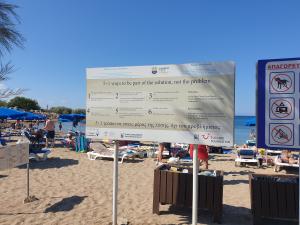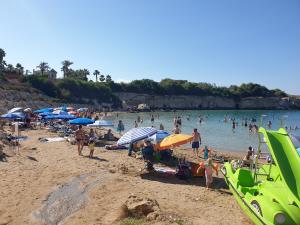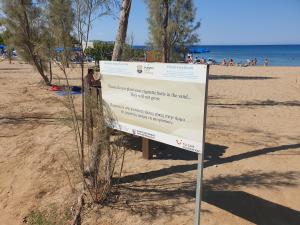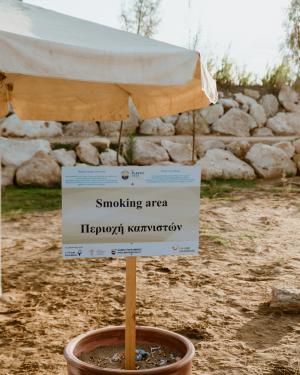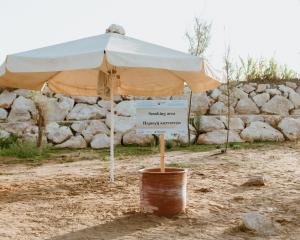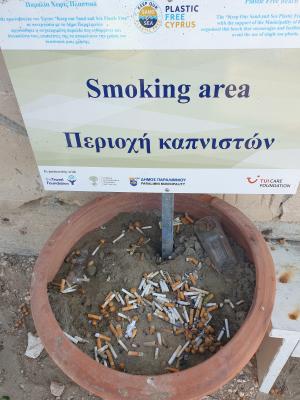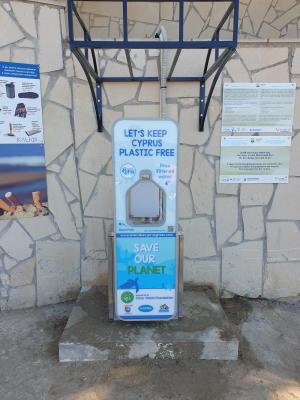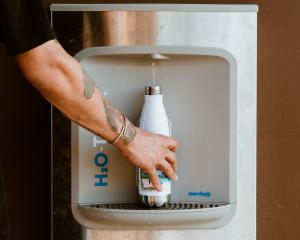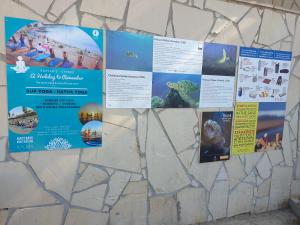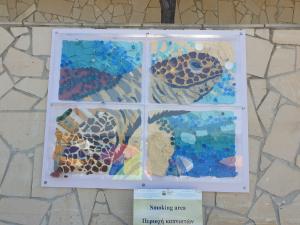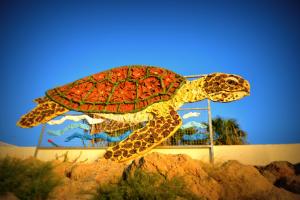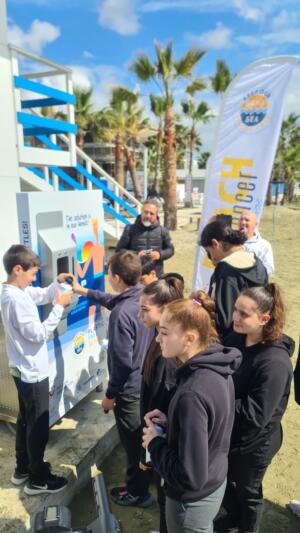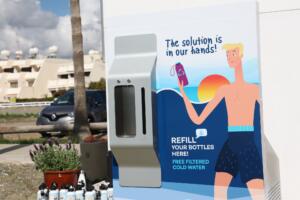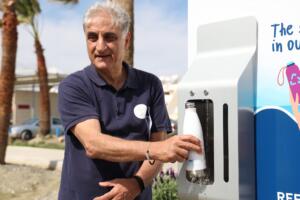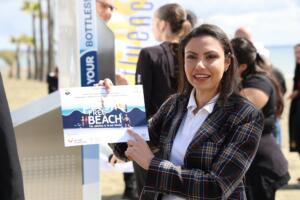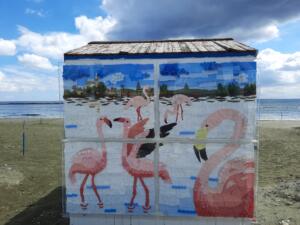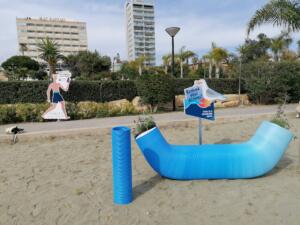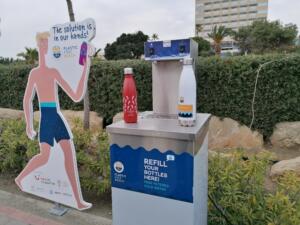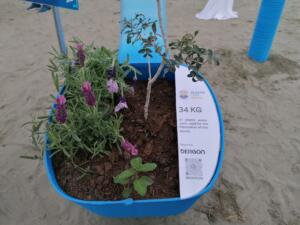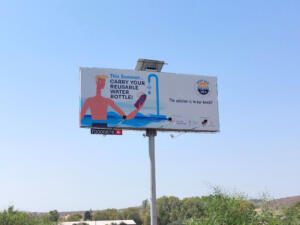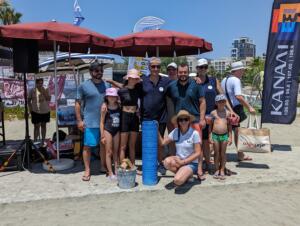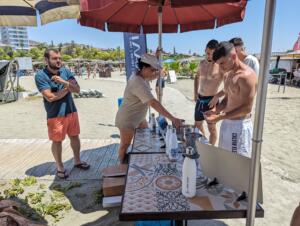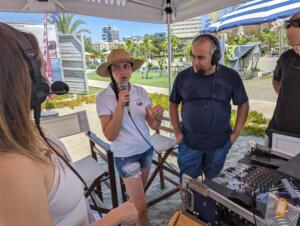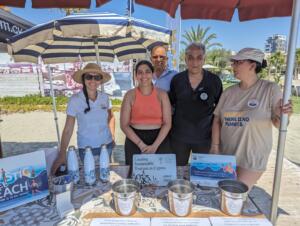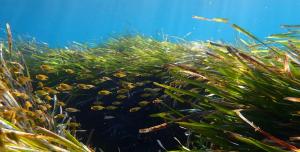
Grants
Sustainable Waste Management
Plastic Free Beach Project
€24,000 awarded
Project duration: 07/2022 – 11/2024
Status: ON-GOING
*Phase 2 of this project has been supported by Depeche Mode and Hublot through the Memento Mori Tour charity partnership!
The partnership has chosen to support projects that tackle plastic pollution. And in this round of funding alone, 7 projects have been supported across 7 countries to foundations within the Conservation Collective network.
The challenge
Plastics make up 95% of sea and beach waste across the Mediterranean1. In Cyprus, around 80% of rubbish collected on beaches comprise of plastics. The UN Environment places ocean plastics among the 6 most serious environmental emergencies causing multiple problems to wildlife and humans through ingestion and leaching of chemicals from plastic products 2. Local authorities have a lot of work to implement in the waste management as the per capita generation of municipal solid waste in 2020 reached 609 kg in Cyprus3, one of the highest in the EU. Additionally, during the summer period the waste increases by 40% due to tourists4. It is a fact that the top waste items that are collected from beaches are plastics and more specifically, single use plastic items5. Overcapacity, ignorance of the beach users and laws not being enforced are the main causes of these issues. These data highlight the need for action to reduce plastic waste. The beach visitors – locals and tourists, need to be educated and made aware of the burning issue of plastic pollution.
- UNEP (2022), Pollution in the Mediterranean, Available at: https://www.unep.org/unepmap/resources/factsheets/pollution https://www.unep.org/unepmap/resources/factsheets/pollution
- Thompson et al. (2009), Plastics, the environment and human health: current consensus and future trends.
- Eurostat (2022), Municipal waste statistics. Available at: https://ec.europa.eu/eurostat/statistics-explained/index.php?title=Municipal_waste_statistics
- WWF (2018), Out of the plastic trap
- Anna Maria Addamo, Perrine Laroche, Georg Hanke, Top Marine Beach Litter Items in Europe, EUR 29249 EN, Publications Office of the European Union, Luxembourg, 2017, ISBN 978-92-79-87711-7, doi:10.2760/496717, JRC108181
The solution
PHASE 1:
The “Plastic Free Beach” Project aims to create a Cypriot Brand that outlines the implementation of the ‘Plastic Free Beach’ a concept first created through the ‘Keep Our Sand and Sea Plastic Free Project’ implemented by the Cyprus Sustainable Tourism Initiative (CSTI) and the TUI Care Foundation. It aims to reduce plastic pollution on the island – especially within the tourism industry – by providing a clear set of criteria that must be met in order for the beach to be labelled under the specific brand. The “Plastic Free Beach” label encourages and facilitates its visitor to avoid the use of single-use plastic and supports the communities in implementing activities on the beach following specific guidelines creating a positive impact on the environment, the local communities and the economy. So far, 4 certified beaches have been established throughout the island which host the appropriate facilities to provide their guests with a unique plastic-free experience.
PHASE 2:
Phase 2 of this project aims to enhance and assure the quality of the “Plastic Free Beach” concept, establishing it as the default option and encouraging the participation of the public. This phase aims to achieve this through two pillars: (i) An awareness campaign and (ii) The securing of the “Plastic Free Beach” concept quality. The awareness campaign will focus on the locals, that are the repeated visitors of the “Plastic Free Beaches”. The idea is to promote the concept of the “Plastic Free Beach” and encourage them not only to visit the “Plastic Free Beaches” but also to actively take part in the initiative i.e., by bringing their reusable water bottles for convenient refills at the water station with free, cold, and filtered water. For all social, environmental or economic issues, the awareness of the public is a critical factor for success to support change. Securing the quality of the “Plastic Free Beach” concept is the second pillar of this project. The number of “Plastic Free Beaches” is increasing on the island and there is a need to secure the quality of these created beaches and ensure that the local authorities will continue to maintain the facilities. Every local authority that agrees to organise a “Plastic Free Beach” in its community commits to providing electricity and water to the water station installed at the beach, maintain the filters (to secure the quality of the water), regularly clean the smoking area, the bins, the toy station etc. This pillar will assure that these actions are taken for the year that will follow after the creation of the “Plastic Free Beach.” Also, under this pillar the project will register the idea and the logo of the “Plastic Free Beach” concept.
Project’s deliverables
PHASE 1:
- A Manual as a tool for creating a “Plastic Free Beach”: The manual will provide solutions and a list of guides that can potentially be applied in other types of locations reducing the environmental impacts of single use plastic.
- A branding package (logo etc) as a tool that creates awareness about the existence of the “Plastic Free Beach” and the environmental reasons behind the need for this type of beach.
- 4 workshops for the introduction of the “Plastic Free Beach” concept to interested parties in Famagusta, Larnaca, Limassol and Pafos districts.
- Meetings with the Deputy Ministry of Tourism and officials from other departments to create a culture for the necessity and positive implications of the creation of a ‘Destination Label’ titled “Plastic Free Beach”.
- A communication package on the created label with the aim to create awareness about plastic pollution, and also encourage best practices about the use of single use plastic in daily life, including beach going.
PHASE 2:
- Social Media Campaign: A campaign will run through social media to inform the social media users about the concept of the “Plastic Free Beach” and engage them to be part of the solution.
- 4 Live Links Events in the existing “Plastic Free Beaches:” These events aim to increase visibility of these beaches and raise awareness of the public.
- Promotional Billboards promoting “Plastic Free Beaches:” 2 Eye-catching billboards will be installed on the roads leading to a “Plastic Free Beach”.
- Promotional video on the “Plastic Free Beach” concept: The video’s purpose is to increase the engagement of the beach visitors and will be used in social media and TV campaigns.
- Participation in 3 tourism related events to promote the idea of the “Plastic Free Beach:” The aim is to spread the message about the “Plastic Free Beach” concept through participation in various events related to tourism.
- Presentations for organised youth groups to engage them in the problem of plastic pollution: 6 presentations will be organised to youth groups to make them aware of the plastic pollution problem and encourage them to be part of the solution.
- “Plastic Free Beach” gifts to participants of events: 200 branded refillable water bottles will be given to the participants of promotional events organised as part of this project.
- Securing the “Plastic Free Beach” quality: A contract will be prepared to be signed by local authorities that adopt the “Plastic Free Beach” concept. This contract will assure the quality of the provided “Plastic Free Beach” facilities (water station, smoking area). The goal of this agreement is to secure the quality standards and sustainability of all created “Plastic Free Beaches.”
- Legal registration of the “Plastic Free Beach” concept: Registration of the concept and logo of the “Plastic Free Beach” to legally establish the concept and assure its quality.
Project Updates
- Euronews article on the creation of the first plastic free beach in Cyprus – 06/06/2022
- Euronews videos on the creation of the first plastic free beach in Cyprus: Greek, English – 06/06/2022
- Plastic Free Beach project press release in Cyprus Mail – July 2023
- Live link: “Plastic Free Beach” – Panayies, Limassol (in front of St. Raphael Resort & Marina) – 23/07/2023
- Live Link: “Plastic Free Beach” – Ammos Beach Bar, Larnaca – 12/08/2023 invitation in Greek & English.
Project Impact
PHASE 2:
- Through “Live Link” events, more than 200.000 listeners learned about the “Plastic Free” message – in addition to the beach users that participated at the events. The events were held at four beaches: the Panagies Plastic Free Beach (Limassol), Makenzy – Ammos Beach Bar (Larnaka), Armonia Plastic Free Beach (Limassol) and at SODAP Beach (Pafos). The events were interactive with music from live links, competitions related to plastic pollution, beach clean-ups etc. Also, the participants had the chance to collect 30 cigarette butts in exchange for receiving a free reusable branded water bottle to avoid the use of plastic bottles in their daily life. Until now 250 refillable water bottles were awarded.
- Additionally, 2 eye-catching billboards were installed with messages against plastic pollution and the need to act. The 1st billboard was up for 2 months and the second one is still up for more than 3 months. The visibility of these billboards is estimated at 35.000 cars passing by on a daily basis. A Podcast was added to the awareness activities related to the social media campaign with more than 2.000 viewers in total.
- In another action, 359 students have been educated about plastic pollution and how the “Plastic Free Beach” concept can support the reduction of plastic pollution, with interactive presentations, pilot projects and upcycling activities.
A bit about the organization
Cyprus Sustainable Tourism Initiative (CSTI) aims to contribute to sustainable tourism development in Cyprus that conserves the environment, supports the local economy & promotes local culture. CSTI has developed several projects to demonstrate the benefits of sustainable tourism to the environment, the society & the economy, to promote local culture & to develop close links between local suppliers & hoteliers/operators, & also to educate & inform the public regarding sustainability issues. CSTI has gained tremendous experience through its projects in tourism. It has introduced sustainable practices, provided training & support to hotels, local enterprises & producers and developing an extensive network with all the stakeholders in the tourism industry. Through its projects, CSTI has developed manuals & training sessions addressed to the stakeholders of the tourism industry. All the manuals were supported by workshops & in-house presentations for the HORECA professionals to gain a better understanding on sustainability matters in their business. CSTI has organized Awareness Campaigns related to waste reduction, saving water & energy, recycling & reduction of single use plastics. CSTI co-organized an International Conference “Waste Management in the Hotel Industry” with great success. CSTI has the expertise to carry out the proposed project related to Sustainable Waste Management and Biodiversity Conservation.

